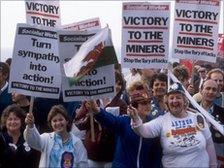Margaret Thatcher: Her contested legacy in Wales
- Published
Margaret Thatcher welcomed the arrival of new, cleaner industries in Wales
Former Prime Minister Baroness Thatcher has died at the age of 87 following a stroke, her spokesman has said.
BBC Wales political reporter Daniel Davies considers her impact on Wales.
When a giant tin portrait of the Iron Lady was hung in the Welsh assembly's Senedd building in 2008, the Plaid Cymru AM Bethan Jenkins said it was an "insult" to the people of Wales.
The Conservative Alun Cairns - known to have kept a poster of the former prime minister on his office wall - credited her with an "important transformation" of the Welsh economy.
The polarised opinions reflect the continued controversy in Wales over Mrs Thatcher's legacy.
She was far from being universally unpopular. In 1983 she led the Conservative Party to its best general election result in Wales with a tally of 14 seats.
Margaret Hilda Roberts was born in Grantham, Lincolnshire, where her father was a grocer. An Oxford chemistry graduate and former president of the university's Conservative association, she won the Finchley seat at the 1959 general election.
Having replaced Edward Heath as Conservative leader in 1975, she led the party to a general election victory in 1979. She launched the election campaign at a rally in Cardiff with a direct appeal to Labour voters.

Striking miners - Thatcher's "enemy within"
She entered Downing Street with a promise to bring harmony where there was discord, but harmony was in short supply in the early 1980s as unemployment soared. Pressed to change course as her approval rating sank, she memorably told the world that the "lady's not for turning".
Victory
Her standing was bolstered by success in the Falklands War in 1982 - a conflict whose impact was felt particularly acutely in Wales. Of the 258 British deaths, many were Welsh, including 32 Welsh Guards killed when the ship Sir Galahad was sunk.
Buoyed by the war victory, and facing a deeply divided Labour Party, Thatcher won the 1983 election resoundingly. This marked the start of the years of high Thatcherism.
Margaret Thatcher was a decisive leader during the Falklands war, says veteran Simon Weston
Her next battle was closer to home - against the trade unions. Having defeated an enemy abroad, she took on the unions and what she termed "the enemy within", in a re-run of her predecessor Edward Heath's conflict with the miners in the previous decade. This time, the outcome was different. For many, Wales' experience of Margaret Thatcher is defined by the miners' strike.
The dispute was protracted and bitter. The bleakest moment came when a taxi driver taking a miner to work was killed when two striking miners dropped a concrete block on his car.
It could be argued that Wales' coal industry was already in decline when Thatcher came to power. But for good or ill, she presided over the most dramatic transformation of the Welsh economy since the industrial revolution. Her time in office saw the demise of an industry and, some would say, a way of life.
It can be easy to forget that other aspects of Welsh life got a leg-up from the Thatcher government.
It took some persuading, but her government agreed to the creation of S4C. Administrative devolution continued throughout the 1980s and 1990s to the extent that Martin Johnes of Swansea University has ventured the idea of "the emergence of a Welsh state". And council tenants in Wales were offered a chance to buy their own homes, and many of them did.
Margaret Thatcher was 'prepared to stand up for what she believed in', says former Welsh Conservative chairman Sir Eric Howells
Two thoroughly Welsh Tories had been mainstays of the first two Thatcher administrations in Wales: Pembrokeshire MP Nicholas Edwards as Secretary of State and the Welsh-speaking Conwy MP Wyn Roberts as Welsh Office minister.
There was controversy in 1987 when, after the Conservatives' defeat of Neil Kinnock's Labour Party at that year's general election, Peter Walker, an MP for an English seat, was appointed Welsh Secretary, the first of four in the role. However, despite Margaret Thatcher's association with the free market, Mr Walker's was an interventionist department.
But the tide was turning against Mrs Thatcher. On the streets, protesters fought the poll tax. And in the Cabinet, opposition to her was mounting. It culminated in her resignation and teary exit from Downing Street in November 1990.
In 2010, Tory AM Paul Davies told his party's conference how flattered he was to be compared to Britain's first female prime minister and a three-time general election winner. The comparison wasn't meant as a compliment - opponents had branded him an heir to Thatcher "the milk snatcher" for his pledge to scrap free primary school breakfasts.
It shows that two decades after she let go the reins of power, she had lost none of her power to divide opinion.
- Published9 April 2013
- Published8 April 2013
- Published8 April 2013
- Published8 April 2013
- Published8 April 2013